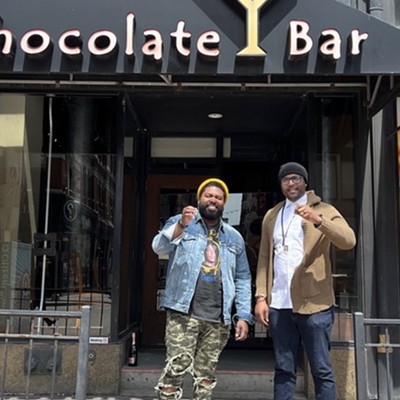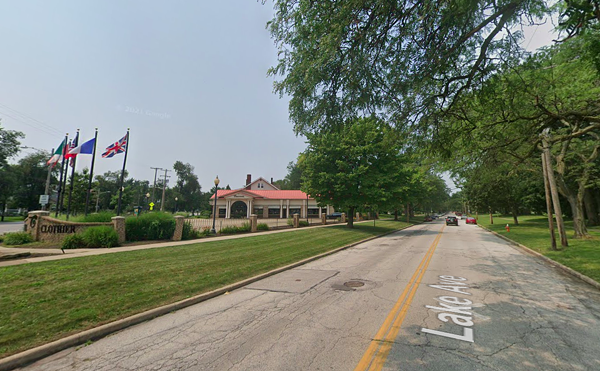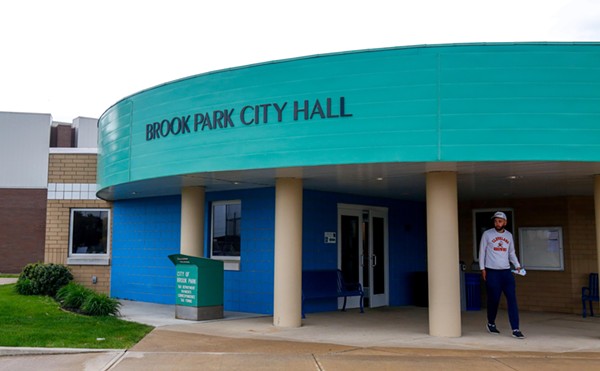Dubè was in a precarious position: He had personally heard Mitchell's various admissions, including that he had made out with a current law student following a party, but he needed to protect his job, for which he had moved from D.C. to take just a few weeks earlier (Dubé was a student of Mitchell's at GW). "I felt that I had no choice but to support Mitchell if I wanted to keep my job," he wrote in his affidavit.
Mitchell's assistant was privy to the dean's candid emotions and conversations, all of which backed up Ku's claims.
"Mitchell told me that he did this hoping and expecting that Ku would not abide by the new requirement, thus providing Mitchell with a pretext to fire Ku as the Associate Dean," Dubè wrote.
When Ku did step down as dean, Mitchell "expressed surprise and relief that he had been saved the work of formally firing Ku," he said, reporting that Mitchell already had replacements in mind. And the Teflon dean reiterated that president Snyder was on his side.
Dubè had tales of his own to tell, ones that further illustrated how manipulative and deliberate Mitchell could be. He relayed how one professor had come to him hoping Dubè could talk to Mitchell on the professor's behalf — it seems Mitchell had been "all over" his date at a recent dinner for senior faculty.
At another party Mitchell hosted for students at his house, Dubè and other staff members saw Mitchell "paying an inordinate amount of attention to a particular female staff member," which they "found to be sexually inappropriate in the presence of students and staff."
This particular female staffer had brought her longtime boyfriend to the dinner. But Mitchell had directed Dubè to arrange the seating chart so that she'd be next to him and to seat her boyfriend on the opposite side of the table next to Dubè, so he could distract him. Mitchell had previously asked him to analyze email exchanges between the two "for sexual attraction." He had also planned on taking her on a business trip to Columbus, but had confided in Dubè that another Case staffer had warned her about taking a trip alone with the dean.
And then there was the time Mitchell pulled his favorite move on Dubè and his girlfriend — inviting them to a guest bedroom in his house and propositioning them for a threesome, pointing out his new silk sheets.
"The sexual proposition from my boss was unwelcome and made me uncomfortable, and I declined to engage in the 'threesome' with Mitchell," Dubè wrote.
The undercurrent of all the allegations, innuendo and firsthand experiences with Mitchell's come-ons and physical interactions was the frequency with which those stories were told around campus. It would be impossible for president Barbara Snyder not to know about Mitchell's inter-school dalliances and sexual habits given the internal complaints and stories circulating around town, and his history before coming to Cleveland. In addition to the anonymous message distributed at the City Club event in January 2012, for example, an anonymous letter was sent to president Snyder in October 2011.
Dubè finally confronted Mitchell on his own in November 2011, fed up with his boss's actions and concerned about the image of the university. After he shared his thoughts about the internal management of the school and sexual impropriety, Dubè says Mitchell stopped meeting with him as regularly and diminished his role.
One month later, in December 2011, Dubè hand-delivered a signed letter to the same provost that took Ku's original complaint: "The letter stated that Mitchell had engaged in sexual relations with a current law student and that he was retaliating against me because of my knowledge of his improprieties. I expressed that this improper conduct was part of 'a pattern of unprofessional behavior.'"
Two days after delivering the letter, and after administrators told him they didn't have enough evidence to start an investigation, Dubè met with two vice presidents at the university: Carolyn Gregory, the VP for human resources; and Marilyn Mobley, the VP for inclusion, diversity, and equal opportunity.
Over a few hours, Dubè outlined the long list of Mitchell's bad behavior and offered to supply specific documents to support his claims. The school officials refused that offer. In a written response to Scene, he elaborated on what he said in his affidavit: "I offered to supply all my e-mails, including all e-mails from my personal account going back to GW, some of which I described. In total, these numbered in the hundreds."
Instead, on Jan. 5, 2012, Mobley sent him a letter that read: "The allegations that you raised could fall within the University's Sexual Harassment Policy, if true, and, therefore, I conducted an initial inquiry under that process to determine whether there was a complaint to be processed via that Policy.
"I can advise you that from my inquiry, I did not obtain any information corroborating the allegations concerning Dean Mitchell... Therefore, this informal inquiry under the Policy is considered closed unless information is received regarding any allegations..." (click here to read the full letter)
This was now twice that the university heard identical claims against Mitchell. In both cases, they dismissed them.
In return for coming forward, Dubè was about to enjoy the same treatment from his employer that professor Ku had endured.
In January 2012, he was reassigned out of the law school "and brought to work next door to Gregory's office" in the human resources department, which was previously used as a storage room. His parking pass was deactivated, his new phone didn't work, his email was rarely accessible, his work computer didn't allow him to sign on and he was given very few assignments.
This set-up was short lived: He was laid off for "budgetary reasons" less than a week later. He was offered a generous severance package if he signed a non-disclosure agreement. He did not.
The university officials told Dubè that Case had a policy to only offer severance packages to employees who have been there for at least a full year, but they were happily offering it to Dubè, repeatedly telling him he was "so close" to that mark. He had only been there five months. He, again, refused to sign it. The VPs informed him he was done working at Case but would receive his regular salary for two and a half more months.
"The amount was such as might be generally attractive in proportion to my salary, and for someone of my age facing a layoff," he wrote to Scene, describing the non-disclosure offer. "I did not sign because I wanted to retain the possibility of speaking or speaking out. I valued my voice."
***A trial for the case is set for January 2015 in Cuyahoga County but is currently on hold as Mitchell's lawyers appeal a discovery ruling by Judge Corrigan.
With the lawsuit lingering, Mitchell resigned from his position as dean of the law school in March, though he'd been on paid leave since Nov. 6, two weeks after the lawsuit was filed. He will also draw another full year's salary for his upcoming sabbatical — he's a tenured professor, after all, and Case has stood behind him during this entire process.
"Upon thorough reflection, I have concluded I that I cannot return to my job as dean with the same energy and enthusiasm that characterized my earlier service," Mitchell wrote in a letter to the school. "At this point, it is in the best interest of the law school for me to step down as dean. I will retain my position as tenured professor and continue to seek to serve the school however I can."
He's maintained a personal blog during his leave, and on April 3 he wrote that he was leaving Cleveland too, in a post entitled "Leaving Egypt." He compared his exit from Case Western to the Book of Exodus, the Hebrew prophet Moses leading the Israelites from slavery in Egypt.
"Today I am leaving a place I have lived for the past few years, a place for me of pain, of disillusionment, of disappointment. I've been thinking a lot about it and where I'm going — to my own promised land" in New York.
Mitchell provided a statement to Scene through his lawyer: "I stepped down as dean in part to concentrate on my defense of this lawsuit and will continue to do so through the judicial system. I have great confidence in the court system and believe the appropriate place for factual evidence to be presented and considered is in the court room, and nowhere else. I also believe strongly in our faculty, staff and students, as well as in the interim deans now leading the school. Any comment on my part would unnecessarily distract from their important work, when in fact the community should focus on the outstanding achievements the law school has made in recent years under my leadership."
President Snyder and provost Baeslack declined to comment for this story, but a Case Western Reserve University spokesman did issue this statement to Scene: "First, the university takes seriously all allegations of sexual misconduct. Second, the claims raised in the lawsuit are many and complex. The appropriate venue for discussing and resolving them is the judicial system, which is best suited to allow due process for all, as well as full and thorough presentation of the facts."
While students were quick to talk and some faculty agreed to only speak anonymously, public comment amongst professors has been even-keeled, but the sentiment centers on looking forward. In the wake of Mitchell's resignation, two interim deans were appointed — Jessica Berg, a law and biomedical ethics professor and associate director of the Law-Medicine Center, and Michael Scharf, a law professor and director of the K. Cox International Law Center — while a nationwide search gets underway.
"I don't think anybody wants to take a particularly strong position on anything," says Cassandra Robertson, one of a few professors to speak on record to Scene. "I mean, none of us really know the facts of what happened. There's an overall sense of not knowing what happened, not knowing who may be in the right, not wanting to make any really strong statements without having that kind of knowledge. We're law professors — we want to let the justice system play out and hopefully to get to the bottom of this."
"One of the good things to come out of all of this is the faculty has very much unanimously rallied around Jessica and Michael, our new interim deans," she says. "Jessica and Michael have been doing a really good job substantively, and the best thing they have done is get faculty unanimously behind them and moving forward with the law school. Larry [Mitchell] has moved on, and I think the school has moved on."
Berg and Scharf declined to comment, but a university spokesman issued a statement on their behalf, extolling the recent success of the law school.
"It has been a privilege to serve this law school and to see the overwhelmingly positive response prospective students have had to the new curriculum we're launching this fall. Our faculty, staff, students and alumni have demonstrated enormous dedication to the school, and their efforts have brought us great success.
"As of April 30, applications are up 63 percent over this date in 2013, and deposits have increased 55 percent over the same date a year ago.
"Meanwhile, our employment figures for the Class of 2013 show a 6.5 percentage point increase over the previous year for overall employment, and an 11-point jump in the proportion of graduates employed in positions that require passage of the bar.
"And last week we learned that 100 percent of our first-time takers passed the Ohio Bar Exam in February."
More applicants, more donors, more employment, better rankings. The school has moved on, for sure. And for Barbara Snyder and company, the ends have justified the means.










